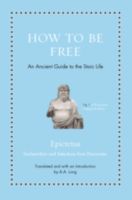
Princeton (2018) h/b 226pp £13.99 (ISBN 9780691177717)
This is a worthy addition to Princeton’s growing series Ancient Wisdom for Modern Readers. The timeless subject addressed here is ‘How to be Free’: in essence, how can I be free to be myself, not enslaved by external forces (though they may have physical control over me) or by internal pressures, emotional or psychological? The ancient wisdom is offered by the Stoic philosopher Epictetus (c. AD 55—135), who was born a slave, lived in Rome, was subsequently freed, became a teacher of philosophy and, after Domitian expelled philosophers from Rome in c. AD 89, moved to establish a school at Nicopolis in north-west Greece.
His teaching—the whole of the Encheiridion (‘Manual’) and extracts from the Discourses—is offered in Greek with a parallel English translation by A.A. Long, Professor Emeritus of Classics and Affiliated Professor of Philosophy at the University of California, Berkeley.
Following its original formulation in Athens in the late 4th century BC, Stoicism developed a highly technical language for its key concepts and L. helpfully identifies the need for a glossary of significant English words which he uses in his translation. He is anxious to alert the reader to the range of ideas which may lie behind a single English word. He explains, for example, that his word ‘tranquillity’ is intended to convey ‘the ideal Stoic mentality, expressed here by two catch words of Hellenistic philosophy apatheia (literally ‘being unaffected’) and ataraxia (literally ‘being undisturbed’).’
In his introduction L. encourages his readers to avoid over-simplifying Epictetus’ subtlety and seeing Stoic detachment as essentially selfish, a difficulty which he (L.) meets by arguing that ‘Tranquillity is an obvious good to the tranquil, but its benefits redound no less to our families, friends and associates because negative emotions often motivate aggressive and hurtful behaviour.’
Having provided readers with the tools to engage with Epictetus’ ideas—and these include an index and suggested further reading—L. lets him speak for himself in a forceful translation which retains the directness of the lecture hall. Of the Encheiridion with its sometimes blunt instructions L writes, ‘If you are like me you will find its abrasive message provocative, invigorating and even comforting.’
Here is an example from L.’s translation:
‘Don’t ever describe yourself as a philosopher or talk much among ordinary people about your philosophical principles; simply do what the principles prescribe. At a dinner party, for instance, don’t discuss table manners, just eat nicely.’
To get the most from Epictetus, his readers need to engage with his ideas and allow themselves to be challenged. He does not reward a casual skim read or offer the easy pseudo-psychology of a self-appointed lifestyle guru, but seeks to articulate a consistent whole life philosophy of what it means to be fully human.
Epictetus was fortunate two millennia ago in being championed by one of his students, Arrian, who recorded, published and promoted his teaching. He is fortunate today in having in Professor Long a thoughtful, learned but discerning champion who, in this book, has indeed brought to life wisdom from the past.
Ray Morris
